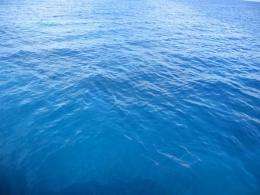Quantifying melting glaciers' effect on ocean currents

(PhysOrg.com) -- A team of scientists from Bangor University and the University of Sheffield have used a computer climate model to study how freshwater entering the oceans at the end of ice-ages 140,000 years ago, affected the parts of the ocean currents that control climate. This is the first study of this kind for the time period.
A paper based on the research, co-authored by Dr Mattias Green, a Senior Research fellow at Bangor University’s School of Ocean Sciences, is currently featured as an “editors highlight” in top US journal, Paleoceanography.
Mattias Green explains: “Freshwater entering the ocean from melting ice-sheets can weaken the climate controlling part of the large-scale ocean circulation, with dramatic climate change as a consequence. During the period of our study, the global temperature dropped by up to two degrees over a few centuries, but changes were not uniform over the planet, and it took a long time for the climate to recover after the ice sheets had melted completely.”
The team argues that it is not only the volume of freshwater being released from the melting ice-sheet which is important but also the state of the freshwater: icebergs act to reduce the ocean circulation less than meltwater, but the effects of icebergs last for longer periods of time.
“This can be compared to the difference between adding very cold water to your drink, or adding an ice cube or two,” explains Mattias
“With meltwater- similar to adding water to your drink, the water spreads out quickly and has an immediate effect, but it is also absorbed quickly into the rest of the ocean. In a similar way to your ice cube, the icebergs drift along and melt more slowly. This means the immediate impact is weaker, but they are there for a longer time and distribute the water over a larger area.”
The study also shows that at the end of the more recent ice-age 20000 years ago the ocean circulation was more sensitive to ice sheet collapses than during the earlier period.
“Our results lead us to conclude that a future ice-sheet collapse, that might happen in Antarctica or Greenland, would have climatic consequences, but the exact impact needs to be evaluated in each case,” adds Mattias.
More information: Green, C. L., J. A. M. Green, and G. R. Bigg (2011), Simulating the impact of freshwater inputs and deep-draft icebergs formed during a MIS 6 Barents Ice Sheet collapse, Paleoceanography, 26, PA2211, doi:10.1029/2010PA002088
Editors' Highlight: www.agu.org/cgi-bin/highlights … 9/2010PA002088&jc=pa
Provided by Bangor University
















